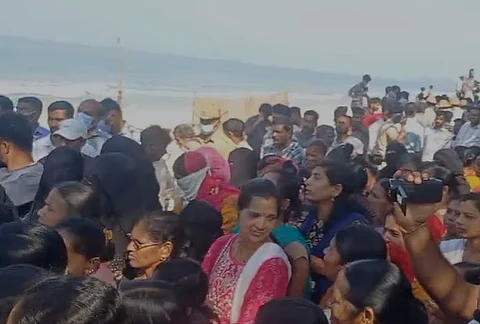

The Honnavar Port Private Limited company, the police and government are bulldozing public opposition to the construction of a port at Honnavar in Uttara Kannada district, and going ahead with the construction, a fact-finding report has alleged. Police have allegedly falsely booked protesters for serious offences such as attempted murder, assaulted them, while the company has disregarded the necessary environmental clearances to push the project ahead, the report has found.
The fact-finding report titled “Eroding Shores, Silenced Protests: A Fact Finding Report of the Honnavar Port Project,” was released in Bengaluru by activist Medha Patkar on Tuesday, November 4, during a press conference.
The report was compiled by All India Central Council of Trade Unions (AICCTU), Fridays For Future–Karnataka (FFF-K), and the People’s Union for Civil Liberties–Karnataka (PUCL-K).
The port project spans 44 hectares of land across five coastal villages namely, Tonka 1, Tonka 2, Pavinkurva, Mallukurva, and Honnavar Rural. Construction of a road linking the port to National Highway 66 has proceeded without informed consent from affected communities, the report says.
Rajesh Tandel, president of the Karavalli Meenugaarara Karmikara Sangha, said at least 32 false cases had been filed against him. “Despite opposing the port from the beginning in 2010, our voices are being deliberately silenced,” he was quoted as saying in a press release.
Rihana, a resident of Tonka village, talked about the shock to the village residents when surveyors turned up one day in 2016 for a “project”. “They forcibly demolished the area wer used to dry fish in. This woke us up to the harsh realities this project would inflict on us and our livelihoods. If they relocate us, where would we go? What work would we do?” she said.
Mahmud Khoya, also a resident of Tonka village, recounted how he was jailed for 24 days in Dharwad “just for questioning” surveyors about their work. “They have harassed us and tried to make our life a living hell but we are still here fighting,” he said, according to a press release.
Activist Medha Patkar questioned the government’s model of development, calling it destructive and unsustainable.
“If we call this development, then it is development at whose cost, but also whose benefit?” she asked, adding that the traditional fishing economy of Honnavar, especially women-led fish processing and trade, represented a more sustainable form of development.
Patkar said the delegation had met Chief Minister Siddaramaiah, who assured that he would examine the matter and withdraw the false cases filed against protesting fisherfolk.
It also criticises police action under Section 163 of the Bharatiya Nagarik Suraksha Sanhita (BNSS), including detentions and alleged medical cover-ups following police assaults during protests.
The fact-finding team warned that construction of breakwaters and road linkages could erode the shoreline and devastate the Sharavathi estuary ecosystem, which supports diverse fish species and serves as a nesting ground for the endangered Olive Ridley turtle.
The groups have demanded the withdrawal of all police cases filed against fisherfolk, accountability for police violence, and revocation of environmental clearances and construction permissions granted to HPPL.
The report was authored by Arindam Roy of All India Council of Central Trade Unions (AICCTU), Sampreetha S of Fridays for Future-Karnataka (FFF-K), and Aishwarya R (PUCL-K).